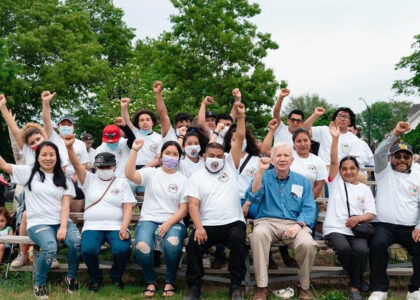NEW BEDFORD — Marlene Cerritos came to the United States when she was 9 years old with her uncle, crossing the border into Texas where they were both detained by U.S. Customs and Border Protection. As a minor, she was sent to live in New Bedford with her parents, both of whom came to the U.S. under temporary protective status after an earthquake in El Salvador. Her uncle had no such luck.
That was in 2005. She is now 16 and a junior at Greater New Bedford Regional Vocational Technical High School. However what comes after high school has always been a question mark in her life because her parents’ documentation does not cover her.
Even though her case was closed in 2007, she has still always been worried about her undocumented status, preventing her from getting a license and barring her from receiving in-state tuition at state schools. There’s also the fear that comes with being undocumented.
“I’ve always been afraid of getting sent back,” she said.
On June 15 however, a tiny bit of hope was born for a better situation for Marlene.
On that day, Secretary of Homeland Security Janet Napolitano issued a policy change endorsed by President Obama. Known as deferred action, the policy allows young undocumented persons to apply for temporary two-year work authorization permits. Applicants must be under the age of 30, present in the country at the moment of the announcement and for at least five years prior, be in school or with a high school diploma or equivalent or have served in the armed services and been honorably discharged as well as have a clean criminal record.
“This is the greatest victory for the immigrant movement in 26 years,” said Conrado Santos, a Brazilian immigrant who qualifies for deferred action and is a coordinator with the Student Immigrant Movement, as he addressed four dozen people in Spanish at the Centro Comunitario de Trabajadores (CCT) on Rivet Street Friday night.
SIM, in cooperation with CCT, held the meeting to inform the immigrant community on the policy because many had been fraudulently convinced to pay for the public information.
“There’s a man who has been charging people $1,000,” said Adrian Ventura, the Spanish-speaking executive director of CCT.
When asked about her reaction to the announcement, Cerritos said that she was both happy and sad.
“I plan to get a license and work,” she said. “I’d be at less risk of deportation with the differed action.”
While the general sentiment expressed at the meeting was positive, there was still a sense that it is nothing more than a temporary fix.
“It’s not much, it’s better than nothing,” said Sonny Eddleston, a member of the United Steel Workers Union and Secretary of the Greater Southeastern Massachusetts Labor Council.
“Once they turn 18, they become a little less human,” said Eddleston, referring to the fact that they are barred from receiving in-state tuition without the authorization.
“We need the support of everyone, be they legal or illegal, that wants to fight for something more,” said Julio Rivas, uncle to five who would be affected by the policy, in a Spanish interview after the meeting.
“I want young people to truly attain their dreams,” he said.
The policy goes into affect Aug. 15 and it is recommended applications for deferred action be made from that day forward.



